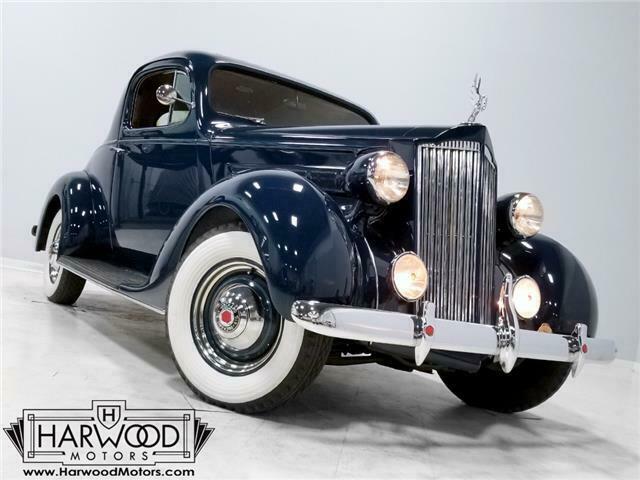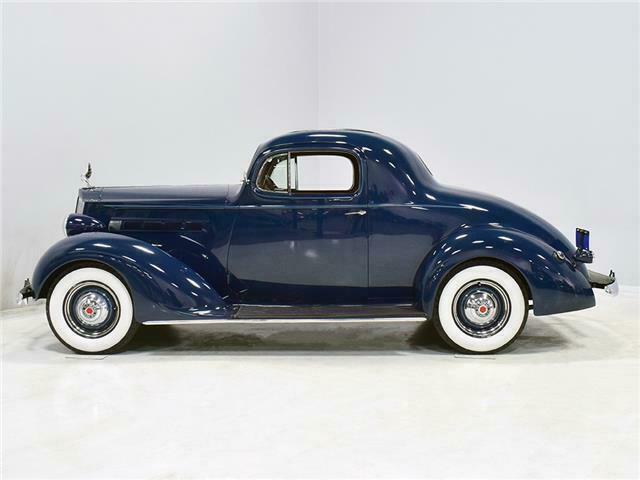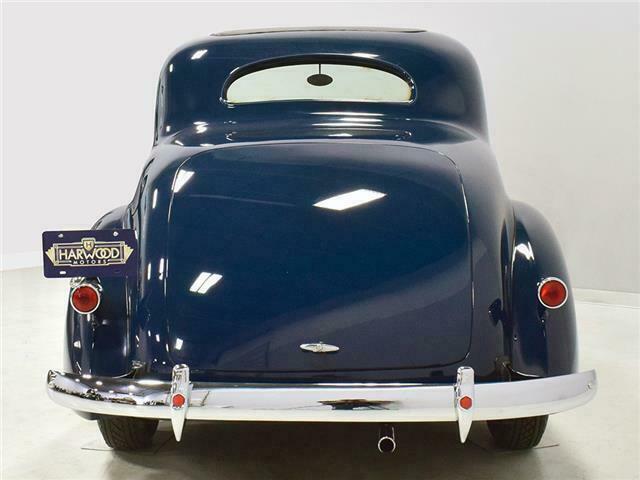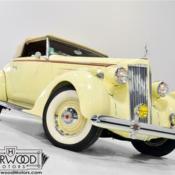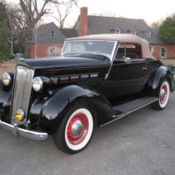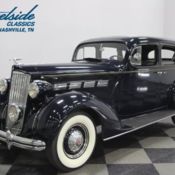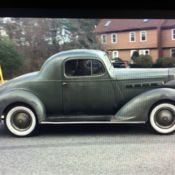Description
We don’t like to talk in absolutes when discussing old cars, but we’re pretty confident that you won’t be able to find a nicer Packard 115 than this gorgeous Centennial Blue 1937 115C business coupe. Although it’s “just†a six-cylinder Packard, someone invested a massive amount of money in the restoration and the result is not only one of the best Packards we’ve seen, but one of the best cars we’ve ever featured. Better yet, the 115 is a wonderful driver: torquey, smooth, agile, and downright fun. The senior Packards get all the glory, but the 115 was built by the same guys using the same high-quality materials and the same careful engineering that made them among the best cars you could buy at any price. Today, this car offers appealing good looks, wonderful road manners, and all the stature that comes with the cormorant hood ornament. Expensive? Only if you grade your Packards by the number of cylinders rather than the depth of their quality. Although this is probably the smallest Packard, it is nonetheless a pretty big car. The top of the grille is chest-high and the cormorant almost looks eye-to-eye with a regular-sized man. From head-on, it is as impressive as a car with twice as many cylinders and the tidy proportions give it presence well beyond its price. The restoration was finished in 2009, and at that time it started collecting awards, including an AACA National Senior First Prize, and it was invited to several concours d’elegance based solely on its quality. We believe the finish is Centennial Blue, a handsome dark blue that’s exactly right on a Packard and the work was extremely well done. Ten years later, it still has a fantastic shine and only very slight signs of use and age—mostly a few well-done touch-ups around the hood opening where it naturally rubs when open. Fit and finish are Packard appropriate, with the only real demerit being that the driver’s door latch is sometimes a little sticky and needs an extra tug to open. Chrome is likewise restored to a high standard and nicely preserved—if you really look closely you might find a few nearly invisible pits or polishing scratches, but again, it’s very minor. The tall vertical grille slats are framed by headlights and accessory Trippe driving lights and yes, the bumper guards are correctly oriented. This is a very pretty car. Inside, the interior was expensively restored to as-new condition. Featuring tan wool broadcloth, it’s obvious that Packard was punching way above the 115’s weight class when it comes to interior appointments. It’s strictly a two-seater with a bit of storage behind the front bench, but it feels spacious and airy inside, making it a great place to spend some time. The banjo-style steering wheel was re-cast and finished in correct colors and the dashboard wears some of the most convincing burled walnut woodgraining we’ve ever seen. Cream-colored gauges are bright and clear, and everything works including the clock, accessory AM radio, and Packard under-dash heater. The trunk is obviously quite spacious, and includes a full-sized spare and original jack assembly that has been restored with the rest of the car. Like all Packards, the 237 cubic inch inline-6 is over-built and delivers robust performance. 100 horsepower and 200 pounds of torque don’t seem all that impressive, but when you realize that its big brother Packard Super 8 delivered 135 with an extra 100 cubic inches it puts things into perspective. It’s a smooth, tough engine that pulls the coupe around with genuine enthusiasm. It starts easily without the driver needing to do anything but press the button—the choke is automatic. Idle is smooth and there’s a pleasing burble from the single tailpipe out back. In the engine bay, there’s almost nothing to hear but some wooshing from the fan and maybe some very faint sounds of the mechanical valves doing their thing. Detailing is correct, from the olive green engine enamel to the new wiring harness to the oil bath air cleaner. The exhaust manifold was left natural cast iron, as it would have been when it was new, and it shows some very light surface scale but to paint or coat it would be incorrect. Even little things like the hose clamps and acorn nuts on the head are pretty much how Packard would have done it in 1937. The 115 shared its transmission and rear end with the 8-cyilnder 120 so the drivetrain is as polished and poised as you’d expect. 4.36 gears in the rear end make it feel lively but the smooth six doesn’t mind spinning along at 55 MPH. The Saf-T-Flex independent front suspension gives the 115 great reflexes and since the brakes were designed for the bigger, heavier, faster 120, they’re extremely effective. Underneath, you’ll also find a nicely detailed chassis that shows a few signs of use but also plenty of evidence of the quality of the restoration. Note the engine splash pans are still in place, the floors are naked so you can see the factory reinforcements and zero evidence that it was ever rusty. Even the rear leaf springs are still wrapped in metal sleeves to keep them quiet. With a 115-inch wheelbase, the ride isn’t quite luxury car smooth but you’ll be smiling ever time you get behind the wheel because it’s just so much fun. Steel wheels were painted and pinstriped to match the bodywork then fitted with hubcaps and trim rings, as well as a set of flashy 6.50-16 Goodyear tires with suitably vintage-looking ribbed whitewalls. Extras include a factory owner’s manual and a display board. This may seem like a lot of money for “just†a six-cylinder Packard, but the extraordinary quality suggests that at least one person was willing to pay whatever it took to make it the best. For those who appreciate quality, this car will delight you, and once you take a drive you’ll realize that six cylinders are more than enough to put a big smile on your face. With big Packard looks and comfort, this is still a car that commands respect anywhere it goes. Call today! Harwood Motors welcomes and encourages personal or professional inspections of any vehicle prior to purchase.
